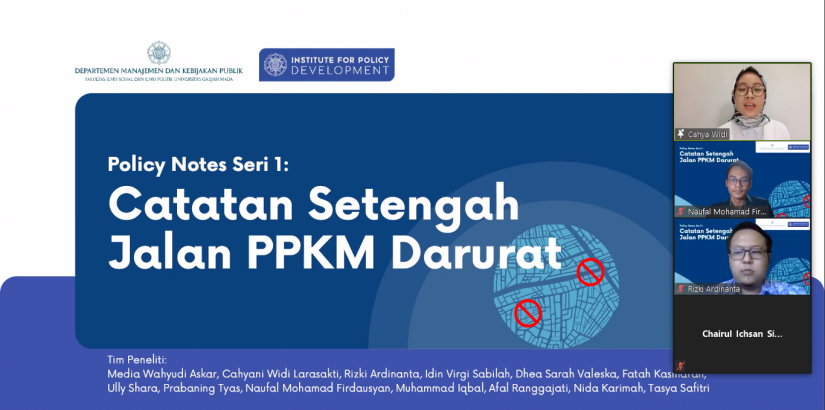
Yogyakarta, July 15th 2021─The Institute for Development Policy (Poldev) under the auspices of the Department of Public Policy and Management (DMKP) of FISIPOL held a press conference on Thursday (15/07). This press conference is related to the dissemination of research results using Big Data entitled “Policy Notes Series 1: The Half Way Notes of Emergency PPKM”. The speakers of this dissemination were: Media Wahyudi Askar, Ph.D., the lecturer of DMKP FISIPOL; Cahyani Widi, S.IP., MDP., researcher at the Center for Capacity Development and Cooperation of FISIPOL; and Rizki Ardinata, S.IP., a researcher from the Poldev FISIPOL.
This dissemination describes the evaluation of the Emergency Community Activity Restriction (PPKM) policy which is analyzed through Big Data from Google Mobility, Google Trends, and machine learning similar web sources. In general, the dissemination consists of the presentation of the results of the analysis covering the mobility trends of the people in Java-Bali, the responses and sentiments of the citizens in the implementation of the Emergency PPKM, and policy recommendations for the Government.
In general, there is a decrease in community mobility in Java and Bali based on the results of an analysis of the increase and decrease in community activity in certain places based on Google Mobility. Widi said that during the implementation of the Emergency PPPKM, the most significant increase in community activities at home occurred in East Java, but in Central Java, West Java, and Banten, there were still many people who carried out activities outside the home. “In general, Emergency PPKM reduces the mobility of the people of Java and Bali, but the decline varies between provinces based on different area categories,” she explained.
During the Emergency PPKM there was also an increase in the enthusiasm of the residents to seek information about health services. This result was presented by Rizki who explained the behavior of the community in responding to the implementation of the Emergency PPKM. Using Google Trends, Rizki explained the analysis of community responses by determining five sub health service keywords, namely: list of vaccines, PCR, health centers, hospitals, and oxygen cylinders. “The community has high enthusiasm for seeking information about health services during Emergency PPKM, this shows the high need for such information,” Rizki said. Rizki continued, based on an analysis from Twitter, in general, public sentiment in Java and Bali tends to be negative by 60 percent compared to 40 percent positive sentiment.
The media then continued with the presentation of several policy recommendations. There are five policy recommendations, in general, including: adding supporting health facilities, adding oxygen cylinders, optimizing policies to work from home, and limiting the inflow of people from abroad.
This dissemination was motivated by the implementation of the Emergency PPKM policy which was launched by the Government on July 3rd, 2021. The implementation of the Emergency PPKM was caused by the second wave of the COVID-19 pandemic which caused a significant increase in cases.
